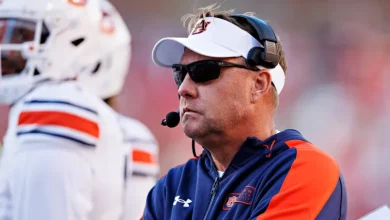‘Nobody wanted…’: Auburn’s Hugh Freeze clears his stance on the SEC’s 9-game plan

‘Nobody wanted…’: Auburn’s Hugh Freeze clears his stance on the SEC’s 9-game plan
In the constantly evolving landscape of college football, conference scheduling often sparks passionate debate among coaches, players, fans, and administrators alike. The Southeastern Conference (SEC), known for its fierce competition and tradition, is no stranger to such discussions. Recently, the SEC proposed a shift to a 9-game conference schedule, an idea that has garnered mixed reactions across the league.
Amid the noise and speculation, Auburn University’s head coach Hugh Freeze has emerged with a clear and candid perspective on the proposed change. Known for his straightforward communication style and deep understanding of SEC football dynamics, Freeze’s comments have added a meaningful voice to the ongoing conversation.
This article dives deep into Hugh Freeze’s stance on the SEC’s 9-game plan, exploring the context behind the proposal, the reasoning behind Freeze’s views, the broader implications for Auburn and the SEC, and the various reactions within the college football community.
—
## The SEC’s 9-Game Conference Schedule Proposal: Background and Context
### Current Scheduling Model
Traditionally, the SEC has operated with an 8-game conference schedule, balancing league competition with non-conference matchups. This approach has allowed teams to maintain historic rivalries outside the conference and schedule marquee non-conference games.
### The Proposed 9-Game Schedule
* The SEC’s shift to a 9-game conference schedule aims to increase in-conference competition and potentially enhance the league’s strength of schedule.
* This would mean one fewer non-conference game, altering the strategic and financial dynamics of scheduling.
* The proposal has stirred debate on competitiveness, tradition, and impact on student-athletes.
—
## Hugh Freeze’s Perspective: A Clear and Measured Stance
### The Core Message: “Nobody Wanted This”
In a recent interview, Freeze was unequivocal in expressing that, from his perspective, the move to a 9-game conference schedule was not widely desired among coaches or stakeholders.
> “Nobody wanted this,” Freeze said candidly. “It’s something that’s being pushed more from the administrative or conference level than from the coaches themselves.”
### Reasons Behind Freeze’s Position
1. **Scheduling Flexibility**
Freeze emphasized that maintaining an 8-game schedule allowed for more flexibility in scheduling key non-conference opponents, which can be vital for recruiting, tradition, and program exposure.
2. **Preserving Rivalries and Tradition**
* Many schools have longstanding non-conference rivalries or games that hold significant sentimental and competitive value.
* Freeze expressed concern that a 9-game conference schedule could limit opportunities to preserve these unique matchups.
3. **Player Welfare and Season Length**
* Adding another conference game lengthens the season and increases the physical toll on players.
* Freeze highlighted concerns about player health and recovery, especially given the intensity of SEC play.
4. **Competitive Balance and Fairness**
* More conference games could create disparities depending on the schedule rotation.
* Freeze worries about fairness in who faces which opponents each season under a 9-game model.
—
## The Auburn Context: What the Change Means for the Tigers
### Impact on Auburn’s Scheduling Strategy
* Auburn has traditionally used non-conference games to test its team, generate revenue, and maintain historic rivalries.
* A 9-game SEC schedule would reduce Auburn’s non-conference opportunities, affecting these goals.
### Recruiting and Exposure
* Non-conference games against high-profile or regional opponents often aid recruiting efforts.
* Freeze sees value in diverse scheduling to attract talent and keep Auburn competitive nationally.
### Preparation for Postseason
* Freeze suggests that balancing the schedule with non-conference games offers teams a better progression into high-stakes conference play.
* The increased grind of 9 SEC games may leave less room to adapt and build momentum.
—
## Broader SEC and College Football Implications
### Impact on the SEC’s National Reputation
* Proponents argue a 9-game conference schedule strengthens the SEC’s national dominance and playoff resume.
* Critics, including Freeze, argue that losing non-conference variety may reduce the league’s appeal and flexibility.
### Financial Considerations
* More conference games could consolidate TV and media revenue within the conference.
* However, fewer marquee non-conference games might reduce some individual school’s earnings.
### Student-Athlete Experience
* Freeze and other coaches are increasingly mindful of balancing competition with the holistic well-being of players.
* The added game raises questions about recovery time, academic balance, and injury risk.
—
## Reactions from Coaches, Players, and Fans
### Coaches’ Views
* Many coaches in the SEC have echoed Freeze’s concerns or expressed cautiousness about the change.
* Some see benefits in increased conference competition, but the consensus leans toward preserving scheduling flexibility.
### Players’ Opinions
* While players appreciate tough competition, there are worries about longer seasons and increased physical demands.
* Player advisory committees are part of the ongoing dialogue.
### Fan Perspectives
* Fans are divided: some want more SEC games for excitement and prestige, others lament losing non-conference rivalries.
* Auburn fans in particular have voiced concerns over losing games against traditional non-conference opponents.
—
## Potential Compromises and Future Outlook
### Balancing Competition and Tradition
* Discussions are ongoing to find a middle ground, perhaps by adjusting scheduling formats or preserving select non-conference games.
* Some propose rotating schedules to balance fairness.
### Monitoring Player Health and Safety
* The SEC and NCAA are investing in protocols and support to mitigate risks of longer seasons.
* Freeze and coaches advocate for continued focus on player welfare.
### Long-Term Impact on College Football
* The SEC’s move may influence other conferences and reshape the landscape of college football scheduling.
* Hugh Freeze’s insights serve as a critical voice advocating caution and thoughtful consideration.
Hugh Freeze’s Voice of Reason Amid Change
Hugh Freeze’s candid stance on the SEC’s proposed 9-game conference schedule highlights the complexities and competing priorities inherent in college football today. His clear message — that “nobody wanted” this change from the coaching perspective — underscores concerns about tradition, player welfare, competitive fairness, and program flexibility.
As Auburn and the SEC navigate this potential shift, Freeze’s perspective offers valuable insight rooted in experience, respect for the game’s heritage, and a commitment to the well-being of his players. Whether the SEC ultimately adopts the 9-game plan or revisits its approach, the ongoing dialogue will shape the future of college football for years to come.
For Auburn fans and college football followers, Freeze’s clarity provides a grounded viewpoint amid a rapidly changing landscape — reminding us all that sometimes, the voices on the sidelines know best.









